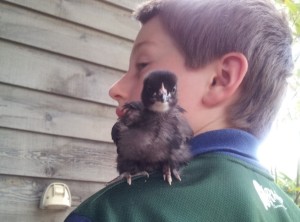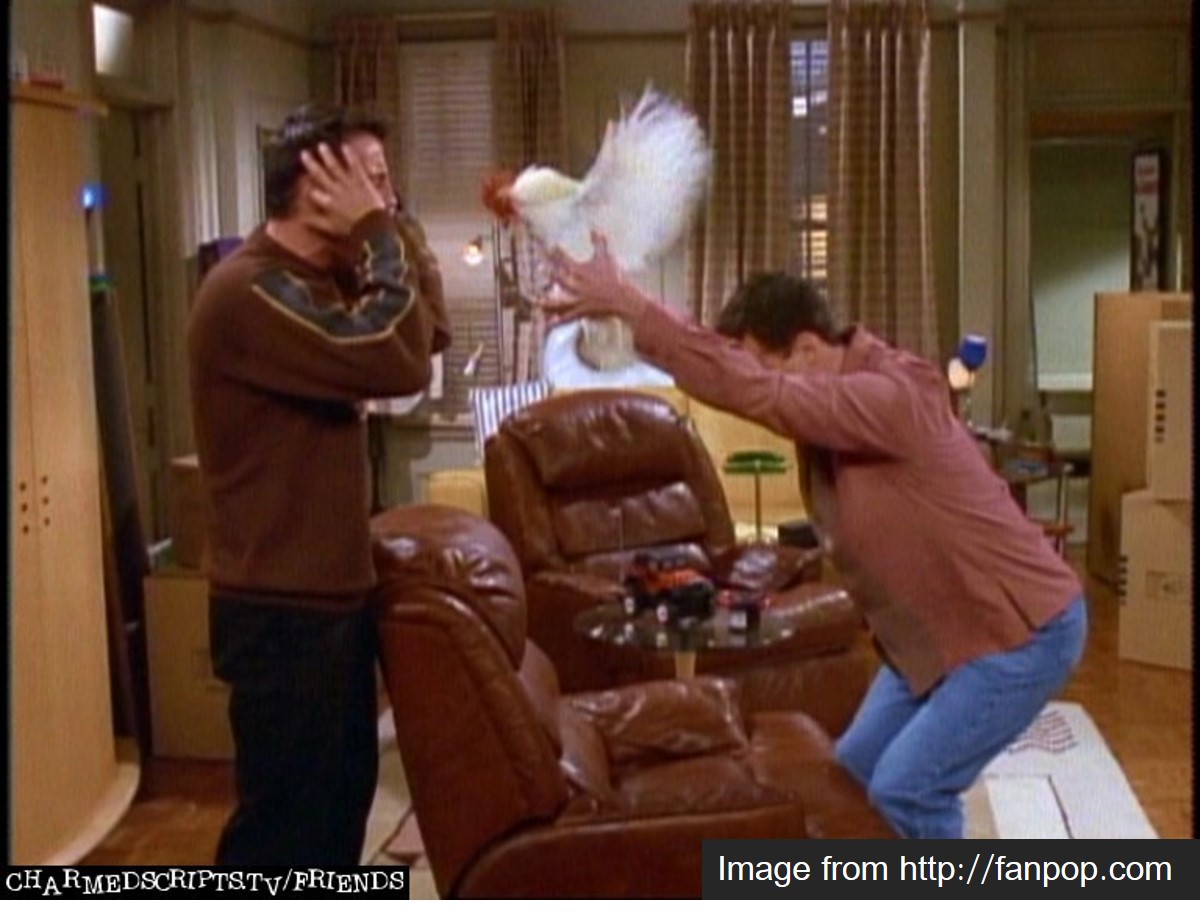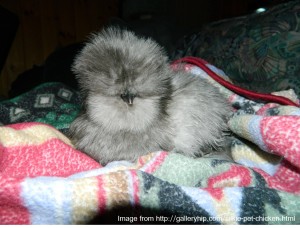Perhaps you’ve toyed with the idea of having a pet chicken, but because you don’t have a large lawn, an indoor pet chicken sounds like a good idea. In some cases, keeping a chicken indoors is actually not only feasible but also entertaining. The classic TV show “Friends,” may come to mind, as you begin to ask yourself difficult questions such as “Where did their indoor pet chicken relieve itself?” and “How can I be sure I don’t end up with an indoor rooster?” Though the show portrays this as a silly, yet honorable, rescue scenario, the friends Joey and Chandler quickly realize that they were anything but prepared for the adventure they had ahead of them.
An indoor pet chicken, like almost any animal, can quickly integrate into your family.
Because of this, it’s important to consider many factors before bringing in a hen, even if it’s a good cause such as a rescue. Below are some important things to consider before making the decision to keep a pet chicken indoors.
- Chickens actually do “shed.” Don’t fall under the misconception that just because they have no “fur,” means they won’t cause allergy flares. They produce a dander and can also shed feathers of all sizes depending on the kind of chicken. Make sure before committing to a pet chicken that your family is tolerant of the allergy risk, or you have a secure place for her outside.
- Consider if this is a permanent move or a temporary one, and prepare for the transition if needed. We mostly find that an indoor pet chicken has first been kept indoors due to an injury. Once the animal heals, the family either becomes attached and attempts to keep her in the home, or they prepare to reintegrate her outside, preferably with other hens. This is something you should likely decide early in the game, as chickens can behave much like a family dog in the sense of bonding, cuddling, responding to cues such as cooking noises and even deciding where its “nest” will be in your home. If you don’t already have a plan to put her outside, chances are high you’ll become attached and end up with a permanently indoor pet chicken!

- Consider the lifetime commitment. A healthy chicken can live almost 10 years, which is longer than a Great Dane! You certainly wouldn’t rush the decision to rescue a dog without considering the lifelong commitment, and a chicken should not be regarded any differently. After all, they adjust to the lifestyle you provide to them, and it would be unfair to toss a sweet, family hen out into a cold hen house after eight years of being spoiled with television cuddling sessions.
- Consider what you’ll do when away from home. While your chicken will likely be fine in the proper cage for a few hours for work hours, if you choose to go on vacation, you may have fewer options than you think. A veterinarian will likely not provide boarding options for feathered friends, and you certainly should not assume she can simply be placed outside with other chickens. Once a chicken is accustomed to living indoors, a transition period with heavy monitoring needs to occur before she can be expected to try an outdoor scenario. In fact, the chicken could even be attacked or pecked by other hens if left to herself in this scenario. The best solution is likely to find a chicken sitter who can attend to your pet in your home, or alternatively, theirs, if your friends are understanding.
- Consider where the chicken will stay and where it will be allowed in the home. Some use special indoor cages for their indoor pet chicken friends when they can’t be supervised. Others use the bottom drawer of a desk or dresser for the pet’s “nest.” While this may sound bizarre, the shape of the drawer is actually quite nice for a chicken! You’ll certainly want to set boundaries with children’s rooms and any other rooms where the chicken may accidentally pick up something harmful or leave a mess.
- Consider your current living situation. This may seem obvious, but if you live in an apartment, your landlord may not allow pets, and likely won’t allow chickens. Consider the popular scenario of the show Friends, where Joey and Chandler are forced to hide their rescued chicken from the landlord. Not only does this provide an issue for those in apartments, but those subject to Home Owners Association regulations as well. Be sure to check with all of the proper authorities, so that you know you can provide a safe, stable, long term environment for your pet. Click Here to find out the best way to look after your pet chickens!
- Find a “Poop plan.” Yes, it sounds silly, but it is the most necessary consideration at the end of the day. Without proper planning or training, your beloved family pet could be forced outside sooner than you originally thought. Some breeds can relieve themselves up to twice in one hour, creating quite a bit more maintenance than dogs in this aspect. There are many articles focusing specifically on this area, but put simply, the easiest route for many is usually a “chicken diaper.” This allows the pet to roam more freely and explore the home, without the worry of the mess she may leave behind. It’s important to research this thoroughly, however, as certain breeds aren’t as suited for diapers as well as others. Other pet owners try different training techniques similar to those used with puppies, such as clicker or treat training. Some simply prefer to clean up after the chicken, especially if it is only inside temporarily. Keep in mind, however, that the latter is most certainly not foolproof and could be problematic with children or other pets in the home. Also, particularly if your chicken is allowed to roam through the entire home, you may find yourself missing spots only to find the surprises weeks later!
If you don’t already have a plan to put her outside, chances are high you’ll become attached and end up with a permanent indoor pet chicken!
Overall, keeping a pet chicken indoors can actually be a rewarding experience. Many people who find therapeutic relief with dogs and cats find similar outcomes when caring for chickens. They adapt to our lifestyles similarly to the way other pets do, and though they each have their own personalities, some are even thrilled to cuddle and watch television with you. If you aren’t able to have a lawn but love the idea of adding a chicken to your family, an indoor pet chicken might be worth considering!











Hi,
I am a photo editor with National Geographic magazine working on a story about bird intelligence. We are looking for a family that has a pet chicken who would be interested in being photographed for inclusion in our coverage. I was hoping that you might be able to introduce to families that are keeping chickens.
Many thanks for any consideration.
Sincerely,
Kathy Moran
Hi I have a hen and a rooster which I may here to keep indoors
I have a Kelsi cock. He’s I door and outdoor . People have been known to fight these as a spot. But I am interested
Excuse the grammatical errors. I was saying people used to kill so cock as a sport. But if you haven’t found anyone I have a very photogenic person I love my animal and be proud to share picture.
Hi,
I had two silky hens for many years, up until recently however, when my oldest girl, Megs, sadly passed away from old age.
In the days following Megs’ death, I noticed her “sister”, Lily, was looking very sad and lonely and acting quite differently than usual.
After speaking with a friend of mine, I decided to get a new friend for Lily. She was only a few months old when I bought her home and I named her Milo. She looked almost identical to Megs.
When I introduced Milo to Lily, Lily’s behaviour changed almost immediately. She loved having company again.
I had planned to bring Milo inside for only the first night, until I found her somewhere cosy and safe to sleep. Lily perches herself high up on top of a six foot fence!!!
Anyway, the next morning, I took Milo outside and she seemed fine. I found an old unused covered cat litter box, that I had planned on filling with straw and putting out under the tree for her to sleep in at night.
Having said that however, things did not quite go to plan, as that night, with the back door left open for my cats, Milo had wandered right on inside!
My daughter and I watched her wander around, exploring her new surroundings. I was sitting in my favourite recliner at the time, and all of a sudden, Milo jumped up into my lap!
I just started patting her and my daughter and I just laughed – only because of how funny it seemed to us. It’s not something I felt you normally have with chickens!
Milo’s new favourite nesting place became the top of my recliner, every single night, from late afternoon until early morning.
I soon got the feeling however, that Milo did not like sharing “MY” recliner with me, as she started pecking my head! And if I went to rest my arms above my head, she would peck them too!!!
This is when I had to start letting her know who was boss, often telling her to behave herself! I got the impression that she did not like being told off, but that was just too bad!
Over the first few nights, I would give her some chicken food to nibble on when she came inside. Then it progressed to me giving her a small amount of our dinner every night in her own bowl.
She quickly came to expect this, because if I dared to sit down to eat my dinner without giving her any, she seemed to give me a dirty look!!!
After struggling to keep up with the large amount of poo, the washing of the sheets and towels I was using, and not liking the pecking, I deliberately closed the back door one night while we went out.
When I got back home, my first thought was of her, so I went to the back door to open it, and to my surprise, Milo was curled up, right up against the door.
I felt so guilty that I had to let her in. The same problems however, continued, so i put her on top of the lounge, the next night she came in, but she did not seem to like that at all, because she did not come in at all the next night or the night after that!
When I went out looking for her, I found her sleeping on one of the swings of my daughters swing set! I felt so guilty that I picked her up, took her inside, and put her rightfully back in her favourite nesting spot – the top of my recliner – which I have now come to accept, that I have to share with my six year old daughter, five cats and one crazy chicken!
Today, Milo came inside late morning, jumped up on top of the recliner and to my suprise, laid her very first egg!! This may well be a sign of what is yet to come for our crazy, feathered and furry family!!!!!
Hi Kathy, And thank you for your question – we think Pet Chickens are very intelligent animals!
Chickens are such clever and intelligent birds, that they can be trained quite happily to become indoor pets, and will even co-habit with other pets inside the house.
Toilet training, or even chicken diapers are essential!
So, Pet Chicken readers, let us know about your pet chicken stories!
We have an indoor chicken that is lame. When we got Luna, we didn’t realize it, but she was injured and had an eye infection. The other chickens pecked her and her injured leg never fully healed, so she can only hop. We decided to keep her inside because she can’t hop into the roosting boxes like the other chickens, and they peck her. She is very sweet, and my daughter adores her. She stays on special blankets that we clean up and wash, and we also have a little pen for her so she can be outside for a few hours a day. She sleeps in my daughter’s bed on a blanket or towel. My daughter, who is slightly autistic, has been very responsible with her and cleans up all the mess. Luna loves her too and talks to her and loves to snuggle. I never would do this on my own, but my daughter is so happy with her pet chicken!
I have an extemely tame Polish chicken that is the main family pet it was raised grom the egg by my 12 yr old twin girls it sleeps under a blanket and is very spoiled her name is princess furry.
We have an OEG bantam hen that lives indoors. She goes outside in a special predator proof run on nice days for a few hours for some sunshine and fresh air for her health and well being, but she free ranges around the house at all other times and sleeps in our bed like a small feathery dog. She has her own fluffy baby blankets by the dozen washed and dried specially for her. We buy her gourmet lettuces and blueberries and all sorts of stuff! She runs the house and we do as we are told! She is very clean and only poos in certain spots, so she is easy to clean up after and is a wonderful constant companion. I could not imagine the house without her – though I think we are her pet humans rather than her being our pet chicken!
Hi,
I was thinking of getting a chicken and raising it indoors, originally I wanted a duck but it takes longer to find out whether a duck is a female compared to a chicken.
The question I have is is there a way to know when your chicken is going to lay eggs (especially if it is an egg laying breed) so that one can take the diaper off? As I am wanting a chicken not just as a pet but for egg laying purposes as well.
I’ve been thinking of either a; Sussex, Buff Orpinton, Barred Rock or Lohmann’s. Unless of course you can suggest other breeds that are docile and good egg layers. By the way is it better that a chicken has another companion or are they good being the only one?
Hi Kc – thank you for getting in touch with us at Pet Chicken!
Firstly, it is generally recommended that chickens live in a flock of 3, but if you intend to keep a pet chicken close with you in the house, there are many instances where one chicken will bond closely with a person.
In terms of eggs – any of those breeds are good layers. Bantams are not as prolific egg layers, and a bit flighty also!
The best way to know when an egg is about to arrive is to prepare a nest for your pet chicken where she can have some privacy and security, and she will usually go to the same place to lay.
When you see her nesting, simply remove the diaper. Your pet chicken will let you know when the egg has arrived!
Hi I have a indoor chicken he is a Malaysian Serama Reggieboy his name is he sleeps in my room with 4 Terriers he chases his tail around an around follows me every were out to shops and so on he no his name he crows 7.20 every morning he’s only the sice of a tin of beans little bit bigger less than 500g hes the best little guy and very clever. ..Cheers Rob
Re: KC
We have a barred rock as an only chicken. She is devoted, social, and lays an egg almost daily. She walks on a harness and leash, travels in an over the shoulder pet carrier bag, and gets along well with our 20 pound terrier mix dog
Our house chicken, Dymphna, a silky bantam hen, just left us at the age of 15. She was part our family and we were a part of her flock. She was the longest lived pet we have ever had. We miss her so much. Today, May 18, 2021, is the 15th anniversary of her being gifted to our daughter by our future son-in-law. She came to live with us when she was between 2 and 3 years old.